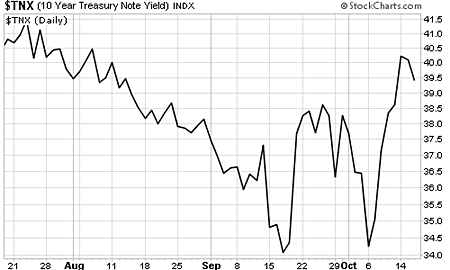Get the latest financial news, insights and expert analysis from our award-winning MoneyWeek team, to help you understand what really matters when it comes to your finances.
You are now subscribed
Your newsletter sign-up was successful
Want to add more newsletters?

Twice daily
MoneyWeek
Get the latest financial news, insights and expert analysis from our award-winning MoneyWeek team, to help you understand what really matters when it comes to your finances.

Four times a week
Look After My Bills
Sign up to our free money-saving newsletter, filled with the latest news and expert advice to help you find the best tips and deals for managing your bills. Start saving today!
"I can't stand to sell at these levels. But I don't have any choice. I need the cash now..."
One of my cycling buddies has a huge house. He spends $30,000 on property taxes every year. He's retired. So to make these payments, he sells a few shares of stock whenever the bills arrive. He built his portfolio around financial companies. This year, they cratered.
"I used to sell 500 shares to pay my tax bill. Now I sell 5,000 shares. It's devastating my holdings. Even if the stock market rises again, I'm still screwed."
MoneyWeek
Subscribe to MoneyWeek today and get your first six magazine issues absolutely FREE

Sign up to Money Morning
Don't miss the latest investment and personal finances news, market analysis, plus money-saving tips with our free twice-daily newsletter
Don't miss the latest investment and personal finances news, market analysis, plus money-saving tips with our free twice-daily newsletter
This story illustrates why the stock markets are falling so much. The world's financial system is founded on debt. Payments must be made every month to service this debt, like my friend must pay his property taxes. If cash runs out, the debtor must sell assets... or declare bankruptcy.
Last week, the whole world rushed for the door. Everyone tried to make payments on their debt by selling assets. Corporations, states, hedge funds, governments, and millions of people like my friend. The stock market collapsed.
The best place to be in a debt crisis is government bonds. Credit crunches lead to recessions and depressions. Recessions are deflationary. Prices fall. Government bonds' fixed coupon payments and safe-harbour status make them the most attractive investments in the market.
(Of course, debt crises end up being inflationary as governments pump lots of money into the economy, but that comes later.)
We're passing through the worst credit crunch in America's history. You'd think government bonds would have soared. But they didn't. The problem is, if Treasury bonds were the last investment on Earth, it wouldn't matter right now. The world needs cash. And it'll sell any asset to get it... even Treasuries.
Look at the recent spike on the chart below. It shows the 10-year Treasury bond yield. When the yield rises, the bond price falls. So you can see bond prices have had a massive collapse, starting September 17. That's one day after the government bailed out AIG... and two days after Lehman declared bankruptcy.

Treasury bonds are perfect for dumping. They are liquid, so investors can sell them easily. And they have high prices. Unlike my friend's bank stocks, you can generate lots of purchasing power by selling them.
My concern is, if this credit crisis gets worse, it's going to trigger even bigger whales to liquidate their Treasury bond holdings... whales like the Chinese, the Japanese, or the oil exporters.
So far, we've only seen what happens when banks and hedge funds liquidate. If Japan and China start unloading or even if they just slow down their purchases the Treasury bond market will fall through the floor.
This sets off another vicious cycle. As prices fall, the interest rates Uncle Sam must pay rise. The higher interest rates rise, the more the US must pay... which makes bond traders mark down the country's credit rating. This sends bond prices even lower...
If the trend grows, we'll see a biblical collapse in the Treasury bond market.
This article was written by Tom Dyson, co-editor of DailyWealth, a free daily investment letter that details unique investments you'll never read about in the Wall Street Journal, Forbes, or any mainstream press.
Get the latest financial news, insights and expert analysis from our award-winning MoneyWeek team, to help you understand what really matters when it comes to your finances.
MoneyWeek is written by a team of experienced and award-winning journalists, plus expert columnists. As well as daily digital news and features, MoneyWeek also publishes a weekly magazine, covering investing and personal finance. From share tips, pensions, gold to practical investment tips - we provide a round-up to help you make money and keep it.
-
 New PM Sanae Takaichi has a mandate and a plan to boost Japan's economy
New PM Sanae Takaichi has a mandate and a plan to boost Japan's economyOpinion Markets applauded new prime minister Sanae Takaichi’s victory – and Japan's economy and stockmarket have further to climb, says Merryn Somerset Webb
-
 Plan 2 student loans: a tax on aspiration?
Plan 2 student loans: a tax on aspiration?The Plan 2 student loan system is not only unfair, but introduces perverse incentives that act as a brake on growth and productivity. Change is overdue, says Simon Wilson

